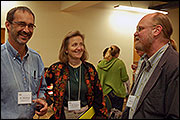UUA launches Leap of Faith program
Growth program sets up mentoring relationships for twelve UU congregations; Association Sunday gifts provide funding.
The program pairs congregations that want help in achieving growth and other goals with “mentoring congregations.” “Our hope is that what these congregations learn from each other will ultimately benefit dozens and hundreds of our congregations,” said the Rev. Dr. Terasa Cooley, the UUA’s Director for Congregational Life. Over the next eight months leaders from these congregations will visit each other, meet via online conferencing, and share information in other ways, including websites, webinars, other social media, and workshops.
Leap of Faith grew out of a May 2010 conference initiated by UUA President Peter Morales that brought together ministers of growing congregations to share information about how to achieve growth and create vital congregations.
Morales said Leap of Faith is about “taking some of our most successful, innovative congregations and pairing them with congregations that are eager to get to the next level.”
One of those congregations is the 450-member Unitarian Universalist Church of Bloomington, Ind., which, along with West Shore UU Church in Rocky River, Ohio (584 members), will be mentored by First Unitarian Church of Rochester, N.Y. (931 members).
For the Bloomington church, the Rev. Mary Ann Macklin said the timing of Leap of Faith is serendipitous. She and co-minister the Rev. Bill Breeden “had been talking about getting some of our leaders on a bus and going to visit some larger congregation for a day or two to see what we could learn,” Macklin said. “Now we don’t have to invent that process. The timing of this is very good for us.”
Macklin said her congregation is healthy and growing. “We have lots of visitors, and our membership classes are full. We’d like to work on issues of creating more space, governance, stewardship, the role of technology, and multigenerational ministry.”
The congregational teams all met for the first time in New Orleans. Most of the costs of the program are being borne by the UUA, including travel costs for up to five people from each congregation. Leap of Faith is being funded from this year’s Association Sunday contributions from congregations, plus contributions from several individual donors. The pilot program’s budget is $180,000, including $30,000 for an independent evaluation.
The evaluators will monitor the program and help UUA staff determine its effectiveness. The Rev. Nancy Bowen, district executive of the Mountain Desert District, is the lead member of a UUA staff team that will guide the program. A final report will be presented to the General Assembly in June 2011, followed by a decision about continuing the program with other congregations.
Cooley emphasized that the congregational pairings are not about “congregations that are not doing well paired with those that are.”
“This is about congregations that are already doing well, but need an extra boost and a perspective they can gain from being in relationship with other congregations,” Cooley said. “We fully anticipate the mentoring congregations will learn as much as the aspiring congregations. The whole idea is the creation of learning communities that can inspire each other.”
The participating congregations are:
- The Unitarian Church in Summit, N.J., (529) and the First UU Congregation in Ann Arbor, Mich., (578) will be mentored by First Unitarian Church of Dallas (1096).
- First Parish in Milton, Mass., (213) will be mentored by First UU Church of Richmond, Va. (544).
- UU Church of Bloomington, Ind., and West Shore UU Church, Rocky River, Ohio, will be mentored by First Unitarian Church, Rochester, N.Y.
- First Unitarian Church of Des Moines, Iowa, (400) will be mentored by First Unitarian in Albuquerque, N.M. (762).
- Emerson UU Church in Houston (472) and First Unitarian Society of Denver, Colo., (328) will share information with each other without a mentoring partner.
The Rev. Gail Geisenhainer, minister of the First UU Congregation in Ann Arbor, says her congregation wants to work on multigenerational worship, governance, and other issues. “I think this program is the right approach––putting the focus on relationships and what we can be together. This is focusing on abundance rather than scarcity.”
“We’re looking forward to getting clusters of lay people in the room together and letting the enthusiasm percolate and cross-pollinate. When you create these face-to-face relationships they don’t go away. We feel blessed to be part of this.”
See sidebar for links to related resources.
Comments powered by Disqus







